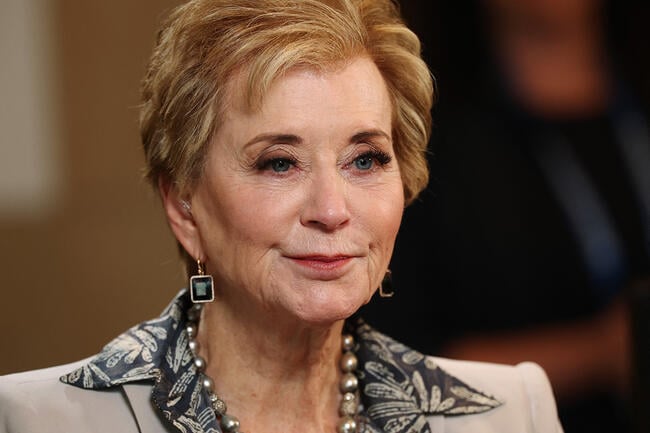You have /5 articles left.
Sign up for a free account or log in.

McMahon’s comments this week reflected a possibly outdated view of accreditation.
Patrick T. Fallon/AFP/Getty Images
Education Secretary Linda McMahon has made clear in recent public statements that the current system of college accreditation needs to change.
She’s accused current accreditors of hindering innovation and called for new actors to join the system. Her comments follow an executive order signed last month that targeted diversity, equity and inclusion standards in accreditation; made it easier for colleges to change accreditors; and opened the door for new entrants.
Firing accreditors is one of the many promises—or threats—President Donald Trump made on the campaign trail as he accused such agencies of failing to hold universities accountable and vowed change. McMahon offered full-throated support for that vision this week, but her comments also raise questions about her understanding of the system she’s aiming to overhaul.
McMahon Pushes Change
McMahon criticized the American Bar Association and accreditors broadly in a recent interview with the conservative website PragerU, arguing that such agencies wield too much power and the marketplace would benefit from competition.
(Contacted by Inside Higher Ed, ABA declined to comment.)
Her remarks came in response to a question about why more universities aren’t opening. She noted that accreditation was a barrier to launching new institutions and argued that there is “a monopoly on accreditors,” singling out the ABA as the sole accrediting agency for law schools.
“The president has said, ‘Nope, we need more competition,’” McMahon said.
Since taking office in March, McMahon has said little about her vision for accreditation changes as she focused on other priorities such as laying off the department’s staff and targeting Columbia and Harvard Universities. But rethinking accreditation is expected to be a top priority for her agency, especially after Trump’s executive order.
McMahon also argued accreditors have stifled innovation and implied that the accrediting system is still regional.
“Universities in certain areas of the country can only use that accreditor that’s in that area, so the president is opening it up and he’s saying, ‘Nope, pick any accreditor that you want, anywhere in the country,’ so you’re not bound, then, by that geographical boundary—what’s working, what’s been thought of that you have to do, like, in the Northeast or the Southeast or whatever. That’s really, I think, going to change and open it up for more competition for universities to open as well,” McMahon said in the interview posted Wednesday.
Regional accreditation was broken up in 2019 during the first Trump administration, and universities have not been bound to regional accreditors since the rules officially changed six years ago. Several institutions have either changed accreditors since then or are in the process of doing so.
The University of Arizona, for example, jumped from the Higher Learning Commission to the WASC Senior College and University Commission, a move that was announced in 2022. Various Florida institutions are also in the process of decamping from their accreditor, though state officials complained last year that the Biden administration had slowed the process. The Trump administration has since released new guidance to make the process of switching easier.
Robert Shireman, a senior fellow at the progressive Century Foundation and a member of the National Advisory Committee on Institutional Quality and Integrity, which advises the education secretary on accreditation, told Inside Higher Ed by email that McMahon’s talking points seem dated.
“It does seem that Secretary McMahon is using some talking points from five or six years ago. The regions are history. That said, accreditation is a complicated and obscure topic, so I’m not surprised that it is taking a while for her to grasp it all while awaiting the confirmation of an undersecretary with more higher education policy experience,” Shireman wrote.
McMahon also needled the ABA and accreditors broadly in a Wednesday appearance at the conservative Cato Institute in Washington, D.C., where she was featured in a conversation about shutting down the Department of Education. There she was asked about improving accreditation.
“It’s a really big topic and a big issue right now. In fact, we are looking at expanding the number of accreditors in the Department of Education, which takes a couple of years,” McMahon said.
She again called out the ABA for being “almost a monopoly” before zooming out broadly and repeating the claim from the PragerU interview that universities were tied to regional accreditors.
“There are accreditors who are assigned to different regions of the country. So if you’re in Florida and you have an accreditor, that’s part of the Southeast, but you really don’t feel like you’re getting your fair shake from these accreditors, and they may be putting all kinds of demands on you that are not necessarily what are looked at by another group of accreditors, and so you’d like to change your accreditation group, you’re not allowed to do that,” McMahon said.
Education Department officials offered some clarity Thursday in response to questions from Inside Higher Ed.
“While accreditors are no longer regional, the pre-clearance requirement put in place by the Biden Administration made it almost impossible for institutions to change accreditors. The President’s EO and Secretary McMahon’s actions will bring additional competition and innovation to the marketplace,” an unidentified department spokesperson wrote by email.
The spokesperson also included a link to McMahon’s comments on last month’s executive order.
A New Accreditor?
On the same day McMahon took shots at accreditors, the University of North Carolina system’s president made a surprise announcement that UNC is “exploring the idea” of establishing a new accrediting agency. That effort, he said in remarks at a UNC Board of Governors committee meeting, would be in conjunction with other public university systems, which he did not name.
“There are frustrations with the cumbersome, expensive, time-consuming burden the current approach places on our campuses, especially smaller institutions that must dedicate significant resources to the process,” Peter Hans said Wednesday, as first reported by The News & Observer.
The UNC system is considering a foray into the accreditation world following state legislation passed without debate in 2023 that would require public institutions in the state to change accreditors every cycle. Florida passed similar legislation in 2022 that mandated changing accreditors.
Both North Carolina and Florida have legislatures with strong Republican majorities. The legislation in both states followed questions from the Southern Association of Colleges and Schools Commission on Colleges over shared governance and presidential hiring processes.




